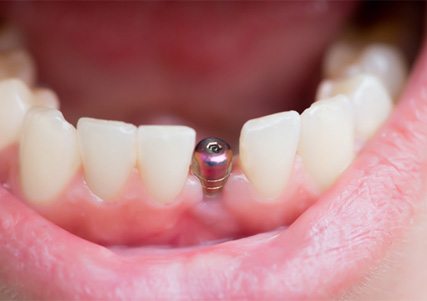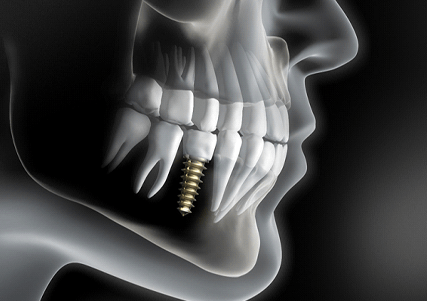
Dental Implants — Saginaw, TX
The Most Comprehensive Solution to Tooth Loss
While there are many ways to replace teeth, there is currently only one solution that effectively replaces the tooth to the absolute fullest. People don’t realize how large of a role the roots of teeth play in restoring your smile’s basic functions. If you want chewing to feel natural or reduce the premature signs of aging that accommodate tooth loss, then dental implants are likely the most appropriate tooth replacement option for you. Dr. Renkuntla can restore your smile to the fullest, whether you’re missing one tooth or an entire arch. Contact his dental office to learn more about the process!

Why Choose Saginaw Dental for Dental Implants?
- Start-to-Finish Dental Implant Treatment
- Digital Impressions System Improves Restoration Process
- Accepts All Major PPO Insurance Plans
What Are Dental Implants?

A dental implant is a prosthetic tooth that’s surgically inserted into the jawbone, designed to replace the entire structure of a missing tooth from the root up to the chewing surface. Since it’s made of biocompatible titanium, it will naturally fuse with the surrounding bone tissue over time via a process called osseointegration. After a few months, you’ll return to our office to have a crown, bridge, or denture attached to your implants. Once you’re all healed up, your results will appear and function just like natural teeth!
The 4-Step Dental Implant Process

Unlike other tooth replacement solutions, dental implants involve a multi-step approach to rebuilding missing teeth. During your initial visit, our team can walk you through the treatment plan so that you know what to expect when completing your smile. Although each patient’s procedure might be slightly different, here are the four main steps of the dental implant process.
Initial Dental Implant Consultation

The first part of your treatment plan will involve a consultation where we will go over your oral health and your situation to determine if you’d be eligible for dental implants. This usually involves seeing if your gums and jawbone are healthy and strong enough to support the metal posts. In some instances, a patient might require preliminary services to prepare their mouth for the procedure. These could include gum disease treatment, bone grafting, or tooth extractions depending on your specific condition. Once we’re able to improve your smile, we can move forward with creating a proper plan for providing your dental implants.
Dental Implant Surgery

Instead of scheduling our patients with a local specialist nearby, our team can perform the entire dental implant procedure in the office. Before starting your treatment, we’ll administer a local anesthetic to keep you comfortable and pain-free during your appointment. Once we’ve confirmed that you’re good to go, we’ll start the process by making small incisions in the gums to access the jawbone underneath, where we will embed the titanium posts at the pre-planned locations and angles before suturing your gums around them. Afterward, we’ll have your trusted friend or relative take you home so that you can rest.
Dental Implant Osseointegration & Abutment

Dental implants typically require three to six months of recovery, meaning you’ll need to focus on keeping your metal post undisturbed and free of bacteria. Your new tooth root will also need to undergo osseointegration, which is the process of fusing with the jawbone to create the lifelike stability needed to support your new pearly whites. Once this is properly completed, you’ll return to our office to receive your abutment, or small metal connector piece that links the restoration to your dental implant. You’ll then need your gums to heal before you can receive your final results.
Delivery of Dental Implant Restoration(s)

After you’ve healed, you’ll come back to our team to get your brand-new dental crown, bridge, or denture. We will verify that your bite is correct and that you’re satisfied with the final results. We’ll also provide you with a guideline on how to make the most of your new smile in the long run.
Benefits of Dental Implants

Why are dental implants becoming increasingly popular as a solution for missing teeth? It’s thanks to the many unique advantages they provide! Unlike dentures that rest on your gums or dental bridges that use your teeth for support, dental implants are placed inside your jawbone. As a result, they offer several benefits for your health and quality of life that other options simply can’t match.
Below are just some of the reasons why so many people are choosing dental implants.
Day-to-Day Benefits

- Able to Handle All Your Favorite Foods: Traditional dentures can slip when you’re trying to chew, which can make eating certain foods difficult. Meanwhile, dental implants are nearly as strong and stable as your natural teeth, allowing you to enjoy your favorite meals without issue.
- Easy to Take Care Of: Dental implants can be brushed and flossed much like your natural teeth, meaning you won’t have to make any major changes to your oral hygiene routine to protect your new smile.
- Can Improve Your Confidence: Because dental implants look and feel like natural teeth, you’re less likely to have reservations about showing them off, which can help boost your self-esteem.
Health Benefits

- Can Help Maintain a Strong Jawbone: When natural teeth are missing, you may experience bone loss in your jaw. However, dental implants can stimulate the jaw to prevent it from deteriorating, thus keeping it strong and healthy in the long term.
- Can Prevent Dental Drift: Empty space in your mouth can cause your remaining teeth to drift, disrupting the balance of your bite. Dental implants fill in any gaps in your grin and ensure that your natural teeth stay in their proper places.
- Can Encourage Better Nutrition: Since dental implants don’t put a limit on your diet, you’ll find that it’s much easier to enjoy a wide variety of nutritious foods to keep your body in good shape.
- Can Improve Oral Health: Because cleaning dental implants is so simple, they can potentially lower your risk for gum disease and other oral health issues.
Long-Term Benefits

- Have a High Success Rate: Dental implants have an extremely high success rate of 95%, thanks in no small part to the many steps that dentists take to keep the risk of complications to a minimum. Even 10 years after the initial placement, you can expect your implants to be as effective and reliable as ever.
- Can Help You Maintain a Youthful Appearance: A deteriorated jawbone can cause your face to collapse, resulting in a sunken, aged look. However, dental implants help preserve your jawbone so that it can continue to support your facial structure, thus helping you look younger in the long term.
- Have a Long Lifespan: Traditional bridges and dentures normally have to be replaced after a few years. Meanwhile, dental implants can last for decades as long as you take good care of them. In fact, it’s not unusual for a patient to keep the same implants for the rest of their life.
Who Dental Implants Can Help

It doesn’t matter if you need to replace a single tooth or all the teeth in your smile, dental implants offer solutions for many forms of tooth loss. Below, you can learn exactly how it’s done, regardless of the number of teeth you need to replace.
- Missing Single Tooth : Replacing a single tooth takes just one titanium dental implant and one porcelain crown that sits on top. The two components are attached via an abutment, which is a small connector that keeps the crown stable. Porcelain material is typically used to restore teeth because of its durability, reliability, and aesthetics.
- Missing Multiple Teeth: To replace one to two missing teeth, dental bridges can be customized to secure to a pair of dental implants. As a bonus, you don’t have to remove existing tooth enamel to hold the bridge since the implants are more than capable of holding the implant-retained restoration.
- Missing All Teeth: Whether you need a full or partial denture that is removable or fixed, dental implants can properly hold it in place. There’s no need for denture adhesive and no reason to worry about your denture shifting out of place.
Understanding the Cost of Dental Implants

At Saginaw Dental, we want all our patients to achieve their best smiles without fearing outrageous bills. There isn’t a flat rate for dental implants because various factors affect the final price tag, like the number of teeth you’re missing. Don’t let the cost of dental implants in Saginaw stand in your way of a complete smile because they are more affordable than you might realize. We offer the financial solutions you need to enjoy the unmatched advantages of dental implants.
Preliminary Treatments & Dental Implant Surgery

Although no two treatment plans are the same, the steps to replace teeth with dental implants are virtually unchanged. It can take several months to complete the process, which gives you more time to pay because the entire balance won’t be due upfront. Generally, you can expect to pay for:
- Preparatory Treatments : Many patients need prep work, like tooth extractions, bone grafting, or periodontal therapy.
- Implant Placement : Oral surgery will also include the cost of sedation or anesthesia.
- Restorations : The type of restoration affects the cost, like a crown, bridge, or denture.
You’ll know exactly what you’ll have to pay before committing to anything, so you won’t be surprised by any unexpected fees.
The Parts of Your Dental Implant

A dental implant recreates the entire tooth from the root up. If you’ve lost several teeth, you will require more dental implants, so you can expect to pay more for each part, which includes:
- Implant Post : A post is surgically placed into the jawbone to serve as a root.
- Abutment : Each post needs an abutment to attach the restoration.
- Restoration : Natural-looking material mimics the surfaces of your teeth.
Although there are discounted materials, you’ll get what you pay for. Your implant dentist in Saginaw will help you choose the best materials for your new smile to ensure your investment looks its best and lasts for decades.
How Dental Implants Can Save You Money

Traditional prosthetics need to be replaced every few years, but not dental implants. They can last for 30 years or longer with the right care, so they can pay for themselves over time. Dental implants also improve your oral health to protect against common issues associated with tooth loss. You’ll avoid dental treatments down the road to reduce your overall oral health expenses.
Does My Dental Insurance Cover Dental Implants?

Many dental insurance plans can be used to offset the cost of certain steps in your treatment. After reaching your deductible, your plan can cover up to 80% of the cost until hitting your yearly limit. We’ll help you maximize your coverage to lower your out-of-pocket expenses, so you have one less thing to worry about.
Making Dental Implants Affordable

We believe everyone should have a healthy, beautiful smile, even if money is tight. We offer multiple payment options to keep dental implants within your budget, including:
- Traditional Payments : Cash, checks, and credit cards.
- Patient Specials : Ask us about any current patient specials, like a free consultation.
- Third-Party Financing : Pay for your new smile in monthly installments.
Dental Implants Post-Op Instructions

Our team at Saginaw Dental can perform and complete your entire dental implant placement at our office. Once we’ve completed your procedure, you’ll be provided with certain post-op instructions that will help promote a smooth and comfortable healing process. While you’ll be informed on the best practices for optimal recovery before and after your appointment, here are the essential guidelines you can expect to follow.
What to Do Directly After Dental Implant Surgery

One of the main priorities during your healing process is to leave the blood clot around your dental implant(s) undisturbed. There are several ways you can help make this recovery period smoother, such as:
- Keep away from smoking or using tobacco products for a couple of weeks.
- Avoid spitting; use tissues or swallow any saliva instead.
- Refrain from touching the surgical site(s) with your tongue or fingers.
- Avoid using a straw when drinking.
Common Side Effects When Recovering from Dental Implant Placement

While every patient is different, many share some of the same experiences when healing from dental implant placement surgery. Some of the common symptoms include:
- Soreness – Patients will typically feel sore around the implant site for a few days. Take over-the-counter/prescribed pain relievers as needed.
- Swelling – Your gums may become mildly swollen for several days following your appointment. This can be alleviated with a cold compress.
- Bleeding – It’s normal to experience intermittent bleeding after oral surgery. Try using clean gauze pads and apply light pressure to control the situation. This should be short-lived.
Your Diet After Dental Implant Surgery

Since you’ll want to avoid disturbing the surgical site(s), you’ll need to avoid consuming food that is difficult to chew or that can accidentally harm your implants. Once you’ve healed sufficiently, you’ll be able to return to eating the majority of your usual foods. Until then, be sure to stick with softer meals, such as:
- Scrambled eggs
- Mashed potatoes
- Pudding
- Soup
- Yogurt
- Pasta
- Ice cream
Post-Op Health & Oral Hygiene

You’ll need to maintain a clean mouth after your dental implant surgery if you want to avoid complications during recovery, such as gingivitis and oral infection. This will also keep bacteria from damaging your connective tissues and leading to implant failure. To avoid this, be sure to practice the following tips:
- Brush your teeth after 24 hours of your appointment. Be gentle around the surgical site.
- Use salt water to rinse your mouth out, and don’t swish excessively.
- Avoid mouthwashes that have high amounts of alcohol.
- Use a prescription mouth rinse if you were given one.
What to Do After Your New Teeth Are Attached

Once it’s time to get your new pearly whites attached, you’ll already be done with the difficult part of the process! You might feel somewhat sensitive around your dental implant(s), but you can easily manage this with over-the-counter painkillers. There also shouldn’t be any intermittent bleeding, swelling, or soreness. If there is, contact us right away for help.
Dental Implant FAQs

Now that you know more about the process of getting dental implants in Saginaw, you’re probably more excited than ever to start your journey toward a complete, fully functioning smile. However, since the procedure is invasive and requires oral surgery, it’s completely normal to have a few questions about it. Luckily, we’re here to help you out. At Saginaw Dental, we’ve decided to answer some frequently asked questions about dental implants. If you’d prefer to speak with a member of our team, don’t hesitate to reach out and make an appointment!
How Long Do Dental Implants Last?
Dental implants are considered one of the most permanent solutions for missing teeth. In many cases, they last well over 30 years – sometimes even a lifetime! Of course, their exact lifespan depends heavily on the patient’s health, oral hygiene, and lifestyle. You can help your new smile last as long as possible by taking proper care of your teeth and gums, visiting your dentist every six months, and avoiding bad habits (i.e., smoking, chewing on your fingernails, using your teeth as tools).
Are Dental Implants Safe?
As long as your dental implants in Saginaw are placed by a qualified professional, they’re considered to be a very safe and successful treatment. If you have issues like low jawbone density or gum disease, Dr. Renkuntla can fix them to ensure there are no complications during your surgery. However, if you have problems that could make the entire process riskier (i.e., diabetes or cancer), our dental team will explain how that’ll affect your treatment and what steps will be taken to make the procedure safer.
What Can Cause Dental Implants to Fail?
Even though it’s rare, dental implant failure usually occurs for one of the following reasons. Peri-implantitis is a type of gum disease that develops from poor oral hygiene, damaging the bone and gums supporting the implant. Failed osseointegration is exactly as the name implies, which is when the implant doesn’t properly fuse with the jawbone. That often happens when the patient had low jawbone density, to begin with. A few other things that cause dental implant failure are chronic teeth grinding, tobacco use, poor oral hygiene, and certain medications. During your consultation, your dentist will explain how you can minimize your risk of implant failure.
Is There Anything You Shouldn’t Eat with Dental Implants?
It’s a good idea to stick to a soft food diet for the first few days after your dental implant surgery. Also, you’ll want to stay away from alcoholic, sugary, acidic, chewy, or hard foods as they can damage or dislodge your restorations. Although you can eat almost anything once your implants are healed, you’ll still want to exercise caution when chewing with your new smile.
Am I too old for dental implants?
There isn’t an age limit for dental implants; however, older patients can have a slightly higher risk of complications, like an infection. With age comes certain health issues, such as diabetes, cancer, or heart disease. Many medications used to treat age-related conditions can suppress your body’s immune system. Therefore, your implant dentist may take extra precautions to ensure your safety and the success of your new smile. After learning more about your medical history and any medications you’re taking, they’ll create a personalized plan to rebuild your smile. It’s not uncommon for older patients to need additional procedures, like periodontal (gum) therapy, bone grafting, or sinus augmentation. Although your treatment plan may take a little longer, the added steps guarantee your new smile has the healthy, strong foundation it needs.
How successful are dental implants?
Dental implants have over a 95% success rate. They are the most reliable method to treat tooth loss. Unlike other tooth replacement options, dental implants can thrive for decades with the right care. Although failure is rare, various factors affect their lifespans, like your oral health and lifestyle habits. You can safeguard your investment by brushing, flossing, and using a daily mouthrinse. Don’t forget to visit your dentist at least twice a year for a cleaning and checkup. Your implant dentist will advise you to avoid anything that may damage your dental implants, like using your teeth are tools, chewing on inedible objects, or eating hard/sticky foods. The location of the post can also play a role. Back teeth undergo more wear and tear than front teeth, so they can have a slightly shorter lifespan.
Are dental implants removable?
A dental implant is unlike any other procedure because it replaces the root and crown. As a result, only a qualified dental professional can remove them, such as in cases of failure. A titanium post is surgically inserted into the jawbone to mimic the root. This allows your bone to fuse to the post through a process called osseointegration. Your implant can stay in place for decades; however, some implant dentures are removable to make them easier to clean.
What should I do if my implant feels loose?
After your jaw has integrated with the post, it should never feel loose. Instability can be caused by multiple problems, like a damaged restoration, infection, or bone loss. It’s best to see your dentist right away to resolve the problem. If you wait too long, your dental implant can fail.
How can I tell if my dental implant is failing?
The early signs of dental implant failure can be subtle, but you don’t want to ignore red, swollen, or tender gums. Any pain or unusual sensations can indicate an underlying concern, like an infection. Often, your dentist can stop the early stages of dental implant failure, so you’ll want to schedule an appointment right away.